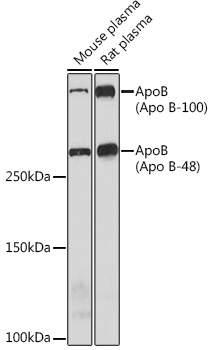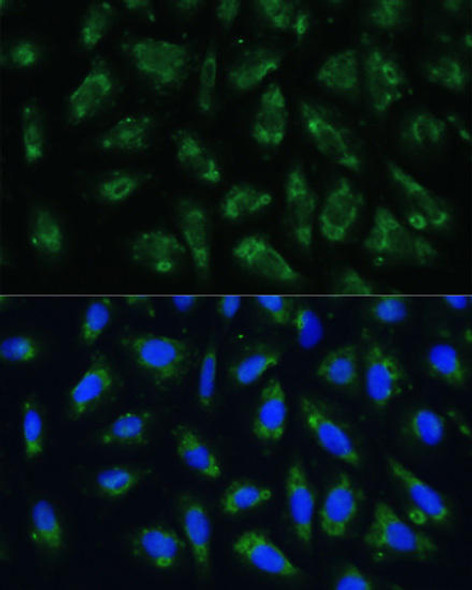Metabolism Antibodies 3
Anti-ApoB Antibody (CAB4184)
- SKU:
- CAB4184
- Product Type:
- Antibody
- Reactivity:
- Mouse
- Reactivity:
- Rat
- Host Species:
- Rabbit
- Isotype:
- IgG
- Research Area:
- Metabolism
Description
| Antibody Name: | Anti-ApoB Antibody |
| Antibody SKU: | CAB4184 |
| Antibody Size: | 20uL, 50uL, 100uL |
| Application: | WB |
| Reactivity: | Mouse, Rat |
| Host Species: | Rabbit |
| Immunogen: | A synthesized peptide derived from human ApoB |
| Application: | WB |
| Recommended Dilution: | WB 1:500 - 1:2000 |
| Reactivity: | Mouse, Rat |
| Positive Samples: | Mouse plasma, Rat plasma |
| Immunogen: | A synthesized peptide derived from human ApoB |
| Purification Method: | Affinity purification |
| Storage Buffer: | Store at -20'C. Avoid freeze / thaw cycles. Buffer: PBS with 0.02% sodium azide, 0.05% BSA, 50% glycerol, pH7.3. |
| Isotype: | IgG |
| Sequence: | Email for sequence |
| Gene ID: | 338 |
| Uniprot: | P04114 |
| Cellular Location: | |
| Calculated MW: | 515kDa |
| Observed MW: | 270KDa/520KDa |
| Synonyms: | FLDB, LDLCQ4, apoB-100, apoB-48 |
| Background: | This gene product is the main apolipoprotein of chylomicrons and low density lipoproteins. It occurs in plasma as two main isoforms, apoB-48 and apoB-100: the former is synthesized exclusively in the gut and the latter in the liver. The intestinal and the hepatic forms of apoB are encoded by a single gene from a single, very long mRNA. The two isoforms share a common N-terminal sequence. The shorter apoB-48 protein is produced after RNA editing of the apoB-100 transcript at residue 2180 (CAA->UAA), resulting in the creation of a stop codon, and early translation termination. Mutations in this gene or its regulatory region cause hypobetalipoproteinemia, normotriglyceridemic hypobetalipoproteinemia, and hypercholesterolemia due to ligand-defective apoB, diseases affecting plasma cholesterol and apoB levels. [provided by RefSeq, Jul 2008] |
| UniProt Protein Function: | Function: Apolipoprotein B is a major protein constituent of chylomicrons (apo B-48), LDL (apo B-100) and VLDL (apo B-100). Apo B-100 functions as a recognition signal for the cellular binding and internalization of LDL particles by the apoB/E receptor. |
| UniProt Protein Details: | Subcellular location: Secreted. Induction: Up-regulated in response to enterovirus 71 (EV71) infection (at protein level). Ref.34 Post-translational modification: Palmitoylated; structural requirement for proper assembly of the hydrophobic core of the lipoprotein particle. Ref.31 Involvement in Disease: Defects in APOB are a cause of hypobetalipoproteinemia familial type 1 (FHBL1) [ MIM:107730]. A disorder characterized by highly reduced plasma concentrations of low density lipoproteins, and dietary fat malabsorption. Clinical presentation may vary from no symptoms to severe gastrointestinal and neurological dysfunction similar to abetalipoproteinemia. Ref.46Defects in APOB are a cause of familial ligand-defective apolipoprotein B-100 (FDB) [ MIM:144010]. FDB is a dominantly inherited disorder of lipoprotein metabolism leading to hypercholesterolemia and increased proneness to coronary artery disease (CAD). The plasma cholesterol levels are dramatically elevated due to impaired clearance of LDL particles by defective APOB/E receptors. Ref.40 Ref.42 Ref.44Note=Defects in APOB associated with defects in other genes (polygenic) can contribute to hypocholesterolemia. Sequence similarities: Contains 1 vitellogenin domain. RNA editing: Edited at position 2180.The stop codon (UAA) at position 2180 is created by RNA editing. Apo B-48, derived from the fully edited RNA, is produced only in the intestine and is found in chylomicrons. Apo B-48 is a shortened form of apo B-100 which lacks the LDL-receptor region. The unedited version (apo B-100) is produced by the liver and is found in the VLDL and LDL. Sequence caution: The sequence AAA51752.1 differs from that shown. Reason: Frameshift at positions 942, 951, 1139, 1165, 1164, 1371 and 1385. |
| NCBI Summary: | This gene product is the main apolipoprotein of chylomicrons and low density lipoproteins. It occurs in plasma as two main isoforms, apoB-48 and apoB-100: the former is synthesized exclusively in the gut and the latter in the liver. The intestinal and the hepatic forms of apoB are encoded by a single gene from a single, very long mRNA. The two isoforms share a common N-terminal sequence. The shorter apoB-48 protein is produced after RNA editing of the apoB-100 transcript at residue 2180 (CAA->UAA), resulting in the creation of a stop codon, and early translation termination. Mutations in this gene or its regulatory region cause hypobetalipoproteinemia, normotriglyceridemic hypobetalipoproteinemia, and hypercholesterolemia due to ligand-defective apoB, diseases affecting plasma cholesterol and apoB levels. [provided by RefSeq] |
| UniProt Code: | P04114 |
| NCBI GenInfo Identifier: | 114014 |
| NCBI Gene ID: | 338 |
| NCBI Accession: | P04114.1 |
| UniProt Secondary Accession: | P04114,O00502, P78479, P78480, P78481, Q13779, Q13785 Q13786, Q13787, Q13788, Q4ZG63, Q53QC8, |
| UniProt Related Accession: | P04114,P78482,Q13789,Q13828,Q59HB3,Q7Z7Q0,Q9UE51,Q9UE52,Q9UE53 |
| Molecular Weight: | |
| NCBI Full Name: | Apolipoprotein B-100 |
| NCBI Synonym Full Names: | apolipoprotein B (including Ag(x) antigen) |
| NCBI Official Symbol: | APOB |
| NCBI Official Synonym Symbols: | FLDB; LDLCQ4 |
| NCBI Protein Information: | apolipoprotein B-100; apoB-48; apoB-100; apo B-100; mutant Apo B 100; OTTHUMP00000115994; apolipoprotein B48 |
| UniProt Protein Name: | Apolipoprotein B-100 |
| Protein Family: | Apolipoprotein |
| UniProt Gene Name: | APOB |
| UniProt Entry Name: | APOB_HUMAN |







